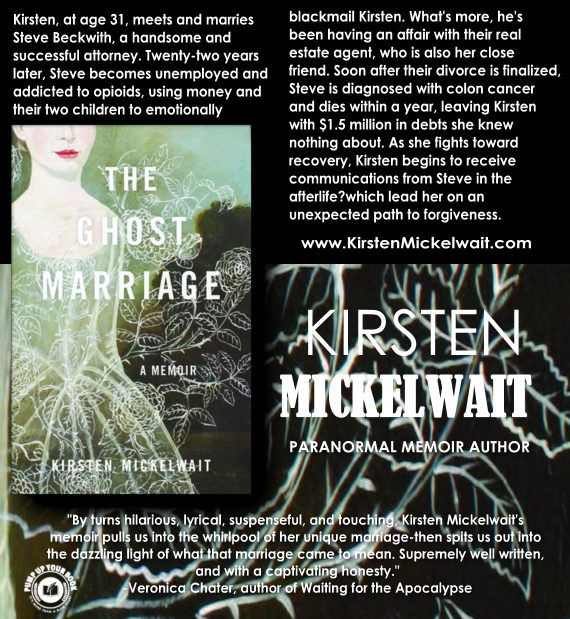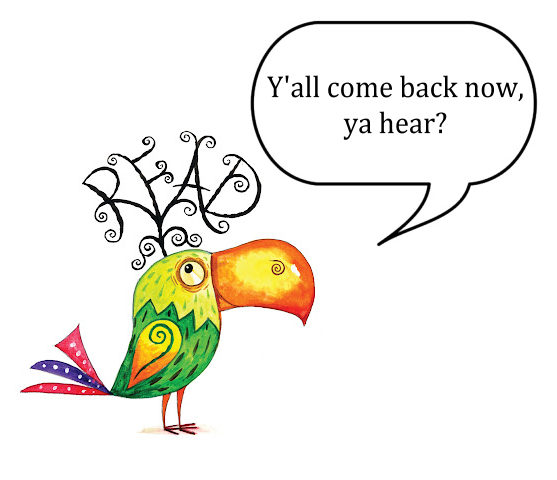Kirsten, at age 31, meets and marries Steve Beckwith, a handsome and successful attorney. Twenty-two years later, Steve becomes unemployed and addicted to opioids, using money and their two children to emotionally blackmail Kirsten. What’s more, he’s been having an affair with their real estate agent, who is also her close friend. Soon after their divorce is finalized, Steve is diagnosed with colon cancer and dies within a year, leaving Kirsten with $1.5 million in debts she knew nothing about. As she fights toward recovery, Kirsten begins to receive communications from Steve in the afterlife―which lead her on an unexpected path to forgiveness.
“A skillfully written, thought-provoking account that positively reconsiders an antagonist as an important teacher.”
―Kirkus Reviews
“What if you accidentally married your worst enemy? With unflinching honesty and hard-earned grace, Kirsten Mickelwait peels the shiny façade off her catastrophic marriage to reveal how she not only survived the lies, betrayals, and lawsuits, but also found her way to compassion. If you don’t think on your ex fondly, The Ghost Marriage will teach you why you should.”
―Meredith May, author of The Honey Bus and Loving Edie
“The Ghost Marriage is an absorbing tale about what happens when you marry Prince Charming and the expected ‘Happily Ever After’ erodes into a kind of ‘Cursed Ever After.’ It’s a story of survival, of adjusted ambition, of how to be quick on your feet when your daily foundation crumbles in midlife.”
―Julia Scheeres, author of Jesusland and A Thousand Lives
“With The Ghost Marriage, Kirsten Mickelwait―in bracing, unsentimental prose― brings us in close to the disturbing history of her troubled marriage. It’s abundantly satisfying to watch her move through each crisis toward new compassion―for herself, but also for her deceased ex-husband.”
―Angela Pneuman, author of Lay It on My Heart and Home Remedies
“By turns hilarious, lyrical, suspenseful, and touching, Kirsten Mickelwait’s memoir pulls us into the whirlpool of her unique marriage―then spits us out into the dazzling light of what that marriage came to mean. Supremely well written, and with a captivating honesty.”
―Veronica Chater, author of Waiting for the Apocalypse
Book Information
Release Date: Audiobook releases April 12, 2022
Publisher: She Writes Press
Amazon: Paperback https://amzn.to/3tYLlcs
I walked into the office at a little strip mall on Jefferson Street, carrying the box and attendant cables. There was no one at the counter, and the sole clerk in the store was engaged with a customer at a side table. Two young girls were playing on the carpet. “I just want to drop this off,” I told the clerk, gesturing with the box in my hands. “Can someone help me do that?”
“Ma’am? You’ll need to wait your turn. I’m helping this customer now, and I’ll assist you when I’m through.” She went back to talking about bundled rates to the woman seated in front of her. I looked at my watch. It was already ten thirty-five. If someone helped me immediately, I could get back to St. Helena by eleven. If I was even five minutes late, I worried that Steve would just leave. I didn’t want to lose my chance to see him in person for another whole week or longer.
“I’m in kind of a hurry,” I said. “Isn’t there anyone else who can help me?” I could see through the window of the door to the back room, where two people stood chatting.
“Ma’am? I’ll help you when I’m done.” She went back to her sales pitch.
I walked over to the door and poked my head in. “Excuse me,” I said.
“Ma’am! Ma’am! You cannot go in there.” The woman at the table was standing up now, yelling. “Our safe is back there. You are not allowed in there! I told you to wait. You can’t just go bothering our other employees. I can have you removed from the store!”
Inside me, something broke, like a jar of some rotten, foul-smelling liquid being dropped onto pavement. The cancer, the job, the commute, the money worries, the divorce, the betrayals, the manipulation.
Everything that I had been sealing off behind a wall of control and composure and hope for four years suddenly burst forth like a flood of raw sewage.
I turned back to face the woman. “Don’t. You. Fucking. Yell at me!” I yelled back, slamming the counter with my fist. “I am a Comcast customer, and I have to be back in St. Helena for an important meeting at eleven o’clock, and you’re making me wait for no fucking reason. There are two employees behind that door! Tell one of them to come out and fucking help me!” Cumulatively, it was the most I’d used the F-word, ever. I felt like a fucking fool. But I was beyond caring. The sales girl stared, and the woman and her children gaped at me, their eyes wide with alarm.
Hearing the commotion, one of the employees came out and ran behind the counter. “Miss? I’m happy to help you now.” She was a woman about my age. Instead of anger or righteousness, she looked at me with genuine concern and kindness. “What can I assist you with?”
It was the kindness that completely undid me. My face crumpled.
I dropped my head into my hands and began to weep. “I’m just trying to return this box,” I began. May Day, May Day! I had lost control in front of everyone. My plane was in a death spiral.
“Miss, don’t worry about it! It’s fine to return the box. Just let me look up your address.”
“It’s not about the box,” I sobbed. Searching in my purse for a tissue. Pushing my hair out of my eyes. Completely humiliated. And yet, did it even matter anymore?
“I understand, miss.” Of course she had no idea what was happening, but she pretended she did.
“Thank you,” I cried. “I’m so sorry, I’m not usually like this.” I managed to spit out my address, but I couldn’t stop sobbing. She typed furiously into her computer, frantically searching for my client account page.
“Uh-huh, uh-huh. Okay then, all set,” she said, and gave me a big smile as she handed me a receipt. “You have a good day now, okay?”
“Thanks. You too.” My sobs were coming so hard, I could barely form the words. I stumbled through the double doors to my car parked just in front. I glanced over my shoulder through the plate-glass windows and could see everyone in the store staring back at me, mouths in little O’s. Then I drove home, twenty minutes, and cried the entire way. By the time I got home, I was out of tears. I thought.
Steve looked terrible. His clothes hung on him like bedsheets. His face was gray. His hair stood up on the back of his head from lying on a pillow, and he was dwarfed as he sat in my big striped armchair. He looked about eighty years old.
We exchanged polite small talk. Rather, I offered it, and he absorbed it like a dry sponge. The man who had played the victim for the past few years was now actually deserving of my pity.
I angled toward the hard part. The real reason I needed to see him.
“Steve, I’m worried about what’s going to happen should you . . . if your condition takes a turn for the worse,” I began.
He made a laughing sound, but without a smile. “I should’ve known you’d be thinking about money at a time like this,” he said.
“That’s not fair,” I said. “We have two children to support. It’s only natural that I’d want to know how we’re going to make this work going forward.”
“You don’t need to worry, Kirsten. The kids will be taken care of.”
“How? Do you have life insurance? Will there be a trust?”
“I don’t have to discuss the details with you. I love my kids, and I wouldn’t leave them without resources.”
“It would just help me to know what the plan is.”
“Look. I’m not dying. The doctor has told me that, as long as I continue with the chemo, I can live to a ripe old age.”
“Well, that’s good news.” Also hard to believe.
Suddenly his face crumpled, as mine had in the Comcast office.
He put his head in his hands and silently wept. It’s so hard to watch a man cry.
“Are you in pain?” I asked.
“No,” he whispered. “I’m just scared.”
“But I thought you said you aren’t dying?”
“Well, we never know, do we?”
“So what should I say to the kids?”
“It’s not really your place to say anything, Kirsten. Isn’t that my job?”
“But Amory has questions.”
“Then tell him to ask me.”
We sat like that for a few minutes in silence, then Steve got up and made his way to the front door. As he turned to leave, I said, “Listen, Steve.”
“Yeah?” His bony hands hung at his sides, like a marionette’s. The lines from his mouth to his jaw, like a Charlie McCarthy puppet.
“I just want to say . . .” And now I was fighting back tears too. Again. “I’m just really sorry. I know I’ve hurt you in the past, and I’m sorry for any pain I’ve caused you.” Justified or not, I had been the cause of at least some of his suffering since I’d ended the marriage.
He looked me in the eye. It was the perfect moment for a mutual absolution. I waited, hoping for his apology too.
“Thanks,” he said. “I really appreciate that.” Then he shuffled to his car.
Kirsten Mickelwait is a professional copywriter and editor by day and a writer of fiction and creative nonfiction by night. She’s an alumna of the Squaw Valley Community of Writers, the Napa Valley Writers’ Conference, the Paris Writers’ Conference, and the San Francisco Writers’ Conference. Her short story, “Parting with Nina,” won first prize in The Ledge’s 2004 Fiction Awards Competition. She lives in the San Francisco Bay Area, where she’s working on a new novel.
Her latest book is the paranormal memoir, The Ghost Marriage.
You can visit her website at www.kirstenmickelwait.com or connect with her on Twitter, Instagram, Goodreads and Facebook.















No comments:
Post a Comment